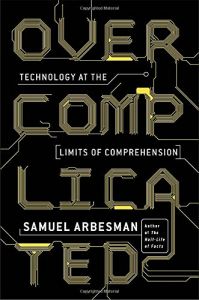Join getAbstract to access the summary!

Join getAbstract to access the summary!
Samuel Arbesman
Overcomplicated
Technology at the Limits of Comprehension
Current, 2016
What's inside?
Interconnected tech is outpacing your capacity to fathom it. Don’t worry. No one understands it all.
Recommendation
The exploding nonlinear complexity of today’s interconnected tech is quickly growing beyond the human mind’s comprehension. Some observers are afraid of this progression, while others hail its seemingly “magical” implications. Complexity scientist Samuel Arbesman reports that neither reaction is appropriate to today’s “overcomplicated,” fascinating reality: a world of “almost organic” tech thriving in ecosystems increasingly beyond human ken. Arbesman says that people can prosper amid the uncertainties of the 21st century’s “Age of Entanglement” (a term coined by computer scientist Danny Hillis) if they think about advancing technology with the right attitude. He suggests starting with humility and leaving both fear and awe behind. With accessible insight, Arbesman lays out the current state of technology and explains some central operating concepts, including “bugs, kluges” and the difference between “complex” and “complicated.” His concise, reality-based overview of the convoluted present throws a welcome anchor to receptive thinkers, students, strategists, investors and leaders. getAbstract thinks it gives you useful advice on how to handle the ever-growing complexity of your digital life.
Summary
About the Author
Complexity scientist Samuel Arbesman is scientist in residence at Lux Capital and a research fellow at the Long Now Foundation. He studies the nature of scientific and technological change. He wrote The Half-Life of Facts: Why Everything We Know Has an Expiration Date.

















Comment on this summary